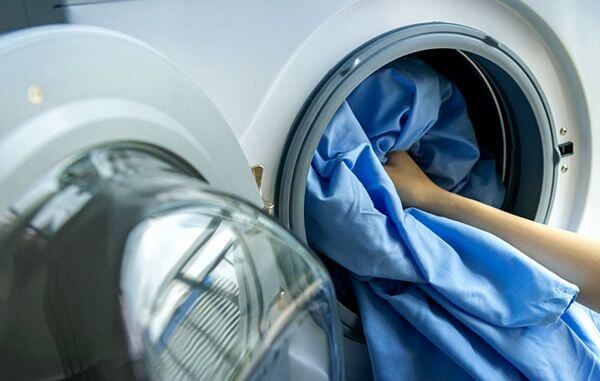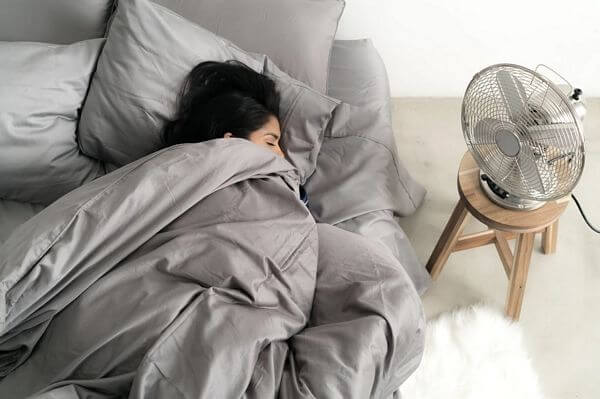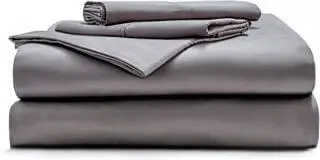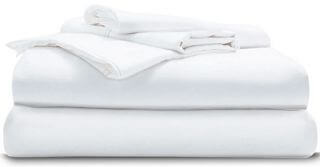How often should you change the sheets on your bed? How often should you wash your bed sheets?
It depends!
I’ve read stories and seen surveys asking people at what frequency do they clean their bed sheets and there are some that don’t wash their sheets any more than once a month and some as much as every couple of months.
The reality is your bed sheets are a breeding ground for bacteria. They come in contact with a lot of body oil, dead skin cells, drool and other stuff that happens in bed.
Table of Contents
How Often to Wash Your Bed Sheets

In a perfect world, if I had the time or was inclined, I’d wash my sheets every day.
What feels nicer than hopping into clean bed, into the fresh set of sheets? It just feels wonderful next to the skin.
But the reality is that’s not practical for many people! What we recommend is at minimum every seven days.
These silver infused bed sheets can be washed three times less often than regular sheets. They’re essentially self-cleaning. They are infused with silver and they kill 99.9% of bacteria.
However, there are other factors that some people encounter and some people don’t.
Some people have very oily skin. For those that have oily skin, you might want to consider doing it a little bit more frequently.
Another factor that influences the cleanliness of your bed is are your pets sleeping with you or are your children sleeping with you? Do you use your bed as a mini office so you’re spending more than the six to eight hours in bed? Or do you watch TV in bed?
Those factors all influence the timetable or the frequency in which you should consider washing your sheets.
For those people that eat in bed, I can almost guarantee you that you’ve got food in your bed. This is another reason why you might want to consider washing them up a little bit more frequently.
There are some things that you can do to help keep your bed a little bit cleaner.
First being consider washing your face every night before you go to bed or better yet, take a shower. When you take shower and you hop into some nice clean sheets, they feel wonderful.
You want to avoid using too much detergent. If you use too much detergent and not rinsing it out, that’s going to leave a residue on your sheets and that’s residue is going to pick up dead skin cells and body oil and other stuff and make your sheets look a little bit dingy.
If your sheets are starting to look yellow, that could be one of the factors. In addition to that, dryer sheets and fabric softeners do the same thing. They coat your sheets. That coating picks up the debris that makes your sheets dirtier and ultimately can make them look yellow.
Something else to consider.
Some people are allergic to dust mites and dust mites are inevitable. They are in virtually every bed. If you’re allergic to them, you may want to consider washing your sheets a little bit more frequently.
Preventing Your White Sheets From Turning Yellow

Sheets yellow for a number of different reasons.
Some of the more relevant ones are too much detergent.
A lot of people prescribe to the adage that if 1/2 a cup of detergent is what the manufacturer recommends then a full cup is going to get them even cleaner.
Well that isn’t the case!
What happens is you are putting too much detergent into the washing machine and it doesn’t rinse properly. Over time it builds up a residue and that residue will collect body oil, dander and other stuff that it comes in contact with.
Another thing that people are guilty of is overloading their washing machine. You only want to put one set of sheets in the washer at a time. If you’re overloading it, it’s not agitating properly and the fabric is not getting as clean as it should.
Another thing that many people are guilty of is when you unmake your bed, you just roll the flat sheet, the fitted sheet and pillowcase all up together into a ball. You take them over to your washing machine and you throw them in the washer.
What you should do at that point is when you’re ready to put them into the washer, unfurl them a little, you want that fabric to be able to agitate properly and have water pass through it and clean it along with the detergent.
Something else you might want to consider with each wash is a half or a quarter cup of baking soda in each wash. Not only will it keep your sheets brighter and cleaner, it will also make them fresher and smell nicer.
In addition, if you have over used detergent and you need to strip it out of there, the way to do that is to put some vinegar. Half a cup of vinegar or a full cup of vinegar, no detergent, just run them through the wash cycle and then rewash them with the proper amount of detergent.
You never want to use fabric softener or dryer sheets. Those coat the fabric and leave a residue that will build up with body oil, dander and other stuff that it comes in contact with.
Another factor that contributes to yellowing sheets is not washing them frequently enough. At minimum you should wash them once per week.


Find Out Why These Sheets Are Called Miracle Sheets!
In the summer months or the hotter months, you have a tendency of sweaty more and collecting more body oil on your skin, so you may want to consider washing them every three or four days.
If you’ve ever gone into a hotel that uses white sheets and most hotels do, you’d be hard-pressed to find yellow ones and the reason is they’re washing them every day. We’re not advocating washing them every day but that washing gets that body oil out and keeps them brighter and whiter.
Another factor that contributes to the yellowing of sheets are dirty mattress pads or dirty pillow protectors. They have a tendency of getting a body oil on them as well. You put clean fresh sheets on them and that oil leeches back into the sheet.
You’ll want to make sure that you wash those items on a regular basis, likely every month to two months. You’ll notice that your pillows will be cleaner and you’re gonna save your mattress and a mattress pad is nice to sleep on, it adds a little bit more cushion to the bed itself.
Even if you have colored sheets and you’re not following these steps, your sheets are not getting as clean as they could. You just don’t see it because of the color in the fabric itself.
How to Prevent Bed Sheets From Pilling
Let’s discuss some reasons why are bed sheets pilling.
A lot of textiles pill and it can be a result of a number of different reasons. One of them is poor quality textiles. Another one is a loose weave. If you look at sweaters, they are really prone to pilling.
A loose weave can aid in the pilling of a fabric or textile.
Exposure to high heat or chemicals. They make the fibers brittle and those fibers break and then they can result in pills.
Abrasion in another factor. Or it could be a combination of all these factors that make your sheets pill.
Here’s an illustration:

Cotton is graded based on a number of characteristics. Color, strength, but fiber diameter and fiber length are one of the factors.
If you take a look at the very short fibers, those are spun into a yarn. That happens when they’re so short, there’s not a lot of length and not a lot of twisting between the other fibers that holds that fiber in place. So over time that short little fiber can start working its way out.
Then you have multiple fibers that are doing the same thing and then when they’re exposed (laying on top of them) those fibers can become twisted up and ultimately result in a pill.
When a very low grade of cotton is used to weave the textiles, there is the inconsistency in the weave, it’s not a particularly tight weave. There are some areas where pills are gonna start developing.
Inconsistent fiber diameter, very short cotton fibers and loose weave are going to result in pilling at some point with these sheets.
What you’re going to want to look for when you’re purchasing your sheets is long or extra-long staple cotton. Miracle Brand sheets are blended with 100% long staple cotton.
These finer grades of cotton do cost a little bit more, but you can get more life out of your bed sheets. Properly taken care of, you can get as much as 10 years worth of use out of a good set of sheets.
When you are caring for your sheets, you want to use a mild detergent. Many products contain brighteners. They are bleach derivatives and they can make the fibers brittle and resulting in breaking and ultimately pilling.
High heat will do the same thing. If you’re cooking your sheets in the dryer, letting them set in the dryer after their dry cycle is done, you’re causing damage to the fiber.
Abrasion is one thing that most people don’t think about.
Some men shave their backs, shave their faces. Many women shave their legs. If you go a couple of days between shaving, you start to build a stubble. When you are tossing and turning, your sheets are just abrading against the stubble. That can cause pilling as well.

